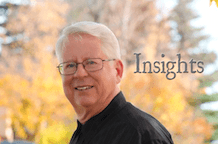 I suspect that there is little difference between many of the memorial services conducted in our mainline churches today from those with no church connection whatsoever. Many may be celebrations of the life of the deceased—eulogies, in other words—but not Christian liturgies. The secularization and multi-faith nature of our society has caused many Christian leaders to hesitate “promoting” their faith on such occasions for fear of offence.
I suspect that there is little difference between many of the memorial services conducted in our mainline churches today from those with no church connection whatsoever. Many may be celebrations of the life of the deceased—eulogies, in other words—but not Christian liturgies. The secularization and multi-faith nature of our society has caused many Christian leaders to hesitate “promoting” their faith on such occasions for fear of offence.
I think this is a big mistake because we are missing out on opportunities to proclaim the Gospel winsomely, honouring our Christian departed, while at the same time respecting mourners who may not be Christian.
Eulogies are important. They convey humanity and suggest how the deceased continues to provide valuable memories for the survivors. Eulogies are by no means uniquely Christian. I have sometimes heard better, deeply spiritual eulogies at secular gatherings remembering a departed colleague. This suggests that those of us who seek to bear witness to our faith need to be much more creative in the way we weave our services into the fabric of an unapologetically Christian burial.
How might we combine a Christian witness while respecting those present who are non-Christian? The most satisfying answer for me was provided several years ago by Jim Taylor, a United Church of Canada author and columnist. He suggested that in liturgical activity surrounding a Christian burial we should attempt to convey how “Gospel values were reflected in the life and witness of the one being honoured.” That simultaneously recognizes the Good News proclaimed and the person to whom we are paying our respects.
Celebrations of life should also offer hope to those assembled for the occasion. Death is a universal phenomenon. All humans, regardless of their faith or lack of it, are here confronted starkly with death. Those of us who are entrusted with the opportunity to offer guidance on such occasions have an important challenge—to represent something both inclusive and special at the same time.
Recently, I was asked to conduct a gravesite committal service for an old friend and mentor who not only professed but practised her Christian faith.
She was well read in contemporary theology and spirituality, and lived her truth authentically in a secular age. Among the mourners were those who followed other faiths, but practiced mutual respect because of her.
I chose to name and elaborate upon seven maxims that informed her faith. We were given another opportunity to learn from her:
Follow the truth wherever it leads.
Adjust to the new normal.
Stay true to the good path you are on.
Share that path with others you care about.
Be ready for whatever lies ahead.
It is OK not to have all the answers.
Care deeply.
While not referencing biblical chapters and verses, these maxims contain profound Christian truths, forged through a life well-lived. They link the celebration of a life with the Gospel and offer hope to those grieving the loss of a loved one.
You might spend some time with these seminal pointers, applying them to your own experience. I will attempt to elaborate further in my next column.
.
Author
-

Wayne Holst
Wayne A. Holst was a Lutheran pastor (ELCIC) for twenty-five years; he taught religion and culture at the University of Calgary for a quarter century and, for 15 years, he has coordinated adult spiritual development at St. David’s United Church, Calgary.






